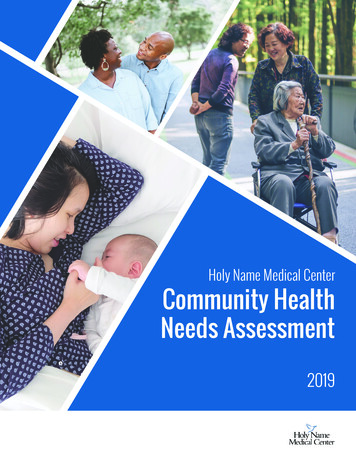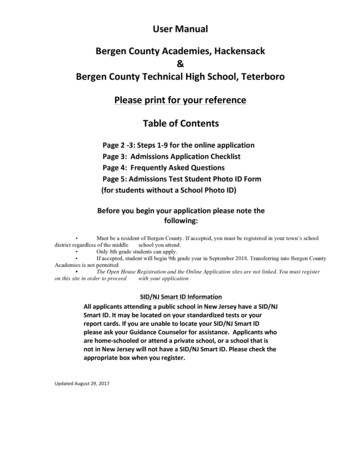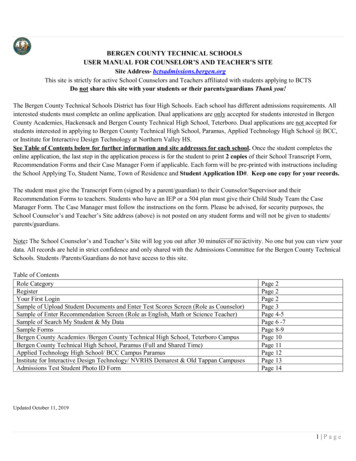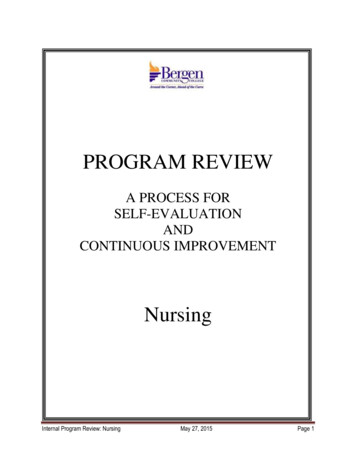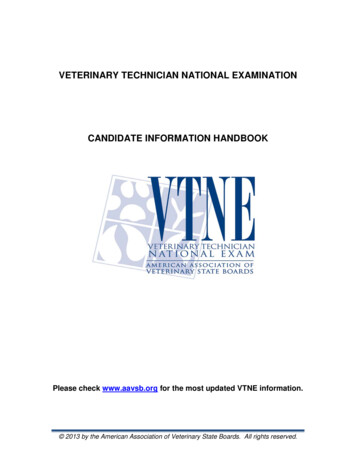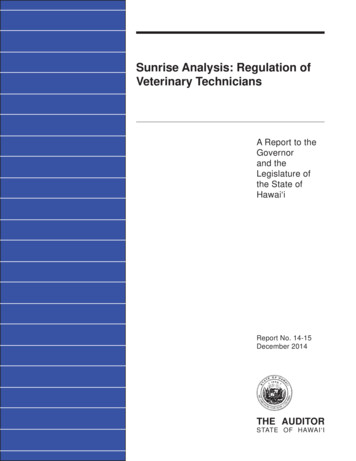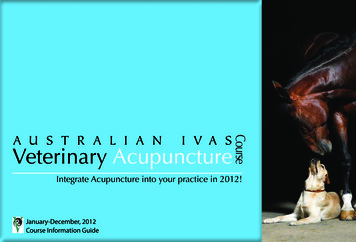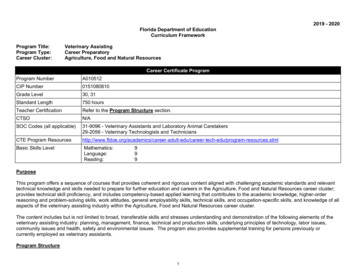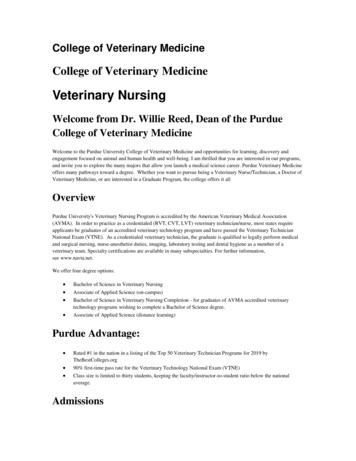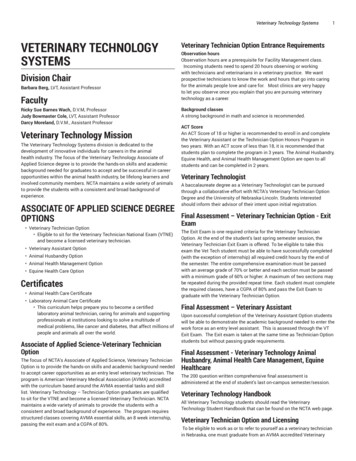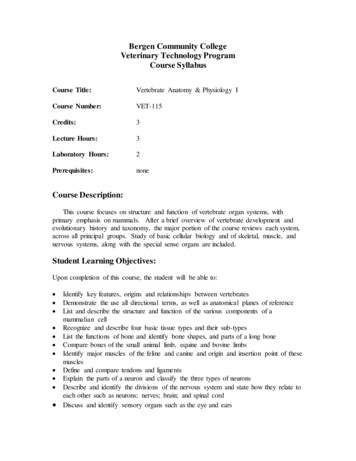
Transcription
Bergen Community CollegeVeterinary Technology ProgramCourse SyllabusCourse Title:Vertebrate Anatomy & Physiology ICourse Number:VET-115Credits:3Lecture Hours:3Laboratory Hours:2Prerequisites:noneCourse Description:This course focuses on structure and function of vertebrate organ systems, withprimary emphasis on mammals. After a brief overview of vertebrate development andevolutionary history and taxonomy, the major portion of the course reviews each system,across all principal groups. Study of basic cellular biology and of skeletal, muscle, andnervous systems, along with the special sense organs are included.Student Learning Objectives:Upon completion of this course, the student will be able to: Identify key features, origins and relationships between vertebratesDemonstrate the use all directional terms, as well as anatomical planes of referenceList and describe the structure and function of the various components of amammalian cell Recognize and describe four basic tissue types and their sub-types List the functions of bone and identify bone shapes, and parts of a long bone Compare bones of the small animal limb, equine and bovine limbs Identify major muscles of the feline and canine and origin and insertion point of thesemuscles Define and compare tendons and ligaments Explain the parts of a neuron and classify the three types of neurons Describe and identify the divisions of the nervous system and state how they relate toeach other such as neurons; nerves; brain; and spinal cord Discuss and identify sensory organs such as the eye and ears
Means of Assessment:The student learning outcomes will be assessed using a variety of assessment instrumentsincluding written exams, demonstration of laboratory skills, quizzes, laboratory reports,written reports, oral presentations, projects, etc.Course Content: State the relationship between mammalian vertebrates and the taxonomichierarchyDefine and interpret key terms in vertebrate anatomy and physiologyDemonstrate the use of directional terms and anatomic planesDiscuss key concepts in cellular biology, including cell structure, function,and the cellular environment, cell transport systems, and reproductionRecognize the structure and function of the four basic tissue types of the bodyIdentify and describe various parts of organ systems, including the skeletal,muscular, and nervous systemsCompare anatomy differences of small and large animalsInterpret the ways in which organs and body systems function and interact Course Materials:Required: Colville & Bassert: Clinical Anatomy & Physiology for VeterinaryTechnicians, 3rd edition, St. Louis, Missouri, 2016; ElsevierColville & Bassert: Clinical Anatomy & Physiology Laboratory Manual forVeterinary Technicians, St. Louis, Missouri, 2016; ElsevierSupplemental (not required): Pasquini & Spurgeon: Anatomy of Domestic Animals, 10th edition, PilotPoint, Texas, 2003; Sudz Publishing Kaimer & McKracken: Dog Anatomy—A Coloring Atlas, Jackson,Wyoming, 2003; Teton New MediaTeaching Methodologies:Lecture topics are covered by a variety of resources including power points withaccompanying outlines, reading assignments, and selected online videos for conceptualdemonstrations. Activities are designed to reinforce and enhance your understanding of
the topics. Laboratory is a combination of laboratory practical exercises anddemonstrations. Models and comparative anatomy skeletons will be utilized, as well asdissection of cat cadavers, for teaching purposes. Additionally in lab, the viewing ofvideotapes and computerized web sites will be incorporated into the teaching methods.Lecture Grading Criteria:There will be three written unit tests and a final comprehensive examination given attimes selected and announced in advance by the instructor. Assignments will be given inadvance and will encompass individual and/or group activities. Assignments aredesigned for you to utilize your resources. Unit exams will cover lecture material,handouts, and required readings. Exams are in any format including multiple choice, fillin, and short answer style. Students are expected to take exams as scheduled. Failure totake a scheduled examination requires the student to contact the instructor within 72hours of the scheduled exam dates AND provide a written bona fide excuse for theabsence. Upon demonstration of a verifiable absence (i.e. medical, family emergency,unavoidable travel, emergency auto repair, police, or court documentation), the instructorwill provide a make-up exam, which will be given in a format of the instructor’s choice.The student may be required to come to campus for a make-up exam, which will beadministered in the testing center on a date specified by the instructor. Failure to contactthe instructor within this given time frame will result in a grade of 0 for that exam.Exams are timed—they will start promptly at the scheduled time and will “time out” afterthe allocated time. If the student is late for logging on to the exam, the student will beallowed to take the exam, however, no additional time will be allotted for completion ofthe examination.Unit exams and the final exam is “closed” book, meaning you should not utilize anyresources. When you open an exam, you must complete it in one sitting within thespecified times. DO NOT minimize your screen, open any other browsers, or leave theexam idle for an extended period of time. If this occurs, an error message will come upand the exam will automatically submit and grade the work that was recorded at thattime. You may take the exam in the convenience of your home. However, if yourinternet access is unreliable, you may opt to come to campus and utilize a computerroom. They are available in all main buildings on campus.Lecture grades will be averaged as follows for 50% of the final course grade:Lecture Quizzes & AssignmentsUnit Exams (3)Comprehensive Final Exam25%10%15%Lecture Quizzes:Lecture quizzes will be given during the semester with a due date:
Online quizzes will be posted on Moodle with opening and closing dates. Allquizzes will open at 8:00am and close at 8:00pm on the designated dates. Youmay work on these quizzes as often as you like prior to the due date (by clickingon “SAVE WITHOUT SUBMITTING” tab). When you have completed thequiz, you will click on “SUBMIT” tab, which will then be graded and posted inthe Moodle Gradebook. No online quizzes will be available after the closingdate, so check the site frequently to avoid a zero.Laboratory Grading Criteria:50% of final course grade: details to be announced by the laboratory instructorBCC Grading Policy:90-100 A86-89 B 80-85 B76-79 C 70-75 C60-69 D 60 FBCC Attendance Policy:All students are expected to attend punctually every scheduled meeting of each coursein which they are registered. Attendance and lateness policies and sanctions are to bedetermined by the instructor for each section of each course.VET 115 Lecture and Laboratory Attendance Policy:Attendance is mandatory. Missing more than two labs may put students at risk forfalling behind in class material and learning techniques for that specific lab time. Labscannot be made up unless discussed with the instructor.Student Accommodations:Students who require accommodations by the Americans with Disabilities Act (ADA)can request support services from the Office of Specialized Services of BergenCommunity College, Room L-116, Pitkin Education Center, 201-612-5269 or.oss@bergen.edu. Deadline for accommodations is posted on this site.Rules and Regulations Governing ConductEach student is expected to obtain a copy of the Bergen Community StudentHandbook and is responsible for knowing the information included in the Handbook.
You may link directly to Student Life and Judicial Affairs to locate the StudentHandbook. I have also provided a Bergen Link on the left hand side of the Moodlecourse: click on Student Life and Judicial Affairs; then click on Student Handbook toaccess. All students and faculty are governed by college rules and regulations. Pleaserefer to the Student Handbook for information regarding codes of conduct beginning onpage 40.Academic IntegrityBergen Community College is committed to academic integrity. Allassignments, quizzes, and exams are to be completed individually, unless otherwiseinstructed. Online quizzes are designed to use your resource materials. Unit exams aredesigned to be “closed book” exams and will be timed for 1 hour. Please refer to thecurrent Student Handbook for details related to academic integrity/discipline, beginningon page 42.Other Student Support Services:DistanceLearning OfficeSmarthinkingTutorial ServiceStudent SupportCenterMoodle HelpDeskTutoring CenterWriting CenterOffice ofSpecializedServicesSidneySilvermanLibraryStudent dent CenterRoom .edu/library/learning/tutor/smart/index.asp1st floor(nearPublicSafety)201-447-7109 option #31-877-612-5381Room L125Room L125Room L115201-447-7908Room L226201-447-7436 (Reference Desk)201-447-7970 (Service 689-7601201-447-7908201-612-5269ossinfo@bergen.edu
Center forHealth,Wellness &PersonalCounselingVeterans CenterOffice ofFinancial AidOffice of 1st ergen@bkstr.comL-1541st floor
Community College, Room L-116, Pitkin Education Center, 201-612-5269 or. oss@bergen.edu. Deadline for accommodations is posted on this site. Rules and Regulations Governing Conduct Each student is expected to obtain a copy of the Bergen Community Student Handbook and is responsible for knowing the information included in the Handbook.
